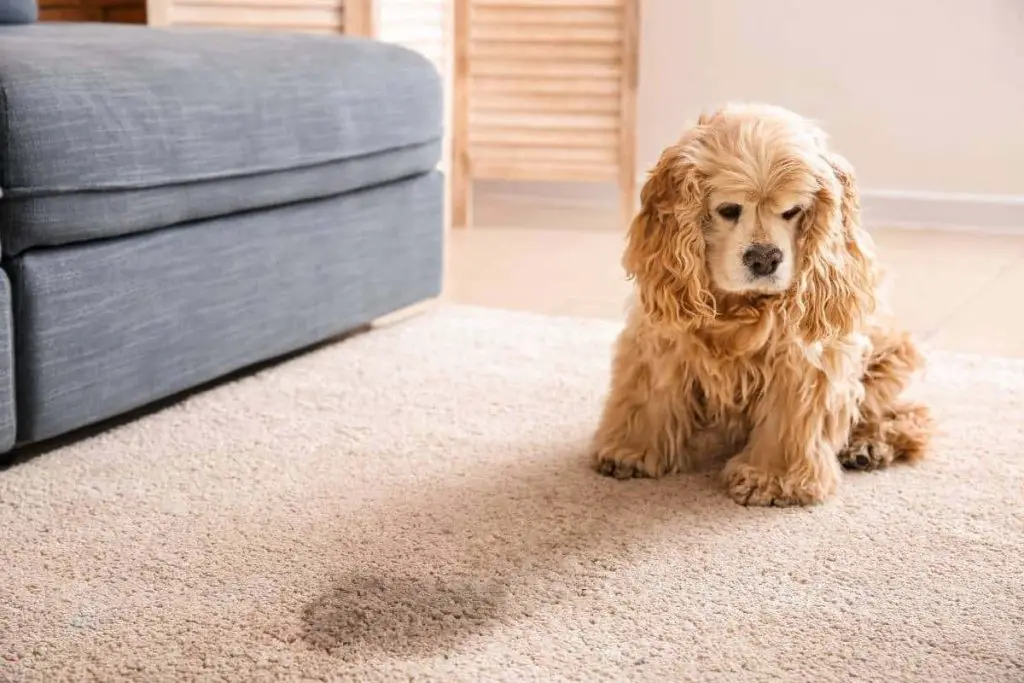Pet odor is an unfortunate side effect of the joys of pet ownership. There’s no way around the fact that sometimes pets smell and can be especially challenging to resolve if a carpet is involved. Unfortunately, getting rid of the smell completely isn’t always as simple as carpet replacement.
Replacing carpet will remove pet odor if the cause of the odor hasn’t contaminated the subfloor. If the pet stain is recent or small, removing the carpet will take care of the smell. But if the stain is old, the subfloor may be contaminated, so replacing the carpet won’t resolve the odor issue.
This article will discuss how to determine if replacing carpet alone will remove the odor and what other remediation steps may be necessary.

Carpet Cleaning vs. Replacement
You may be wondering if regular carpet cleaning can get rid of pet odors. Unfortunately, most pet odors, especially those stemming from pet waste, contain acids that can seep into flooring materials and be present for years.
Even expensive cleaning products or professional cleaners may not fully solve the problem. Most topical cleaning treatments will resolve the issue temporarily, but the odor will return over time. Therefore, in most cases, carpet replacement is a superior solution for dealing with pet odor (source).
Assessing the Scope of the Problem
There are different causes of pet odors. One can be the normal scent of an animal over a period of time, especially if you’re not bathing them regularly. Some pets, like dogs, spend time both indoors and outdoors, so they’ll naturally bring in odors that you may not want in your home.
Another common source of pet odors is animal waste, often attributed to accidents in the home. Pet urine is an especially poignant smell that can be difficult to remediate.
Routine Pet Odors
If your pets are house trained and haven’t had accidents on the carpet, the pet odor is likely coming simply from the animal living in the house. Even with regular grooming and bathing, animals have a natural smell that’s difficult to avoid. However, the odor has likely not seeped through the carpet in these cases, and you can address the issue by replacing it.
These types of odors are also not usually noticeable in the carpet for the first several years of use, so you don’t have to replace it often.
Waste-Related Pet Odors
Waste-related pet odors in carpet can be trickier to resolve. Pet soil can easily set into the carpet and, if left untreated, can leak through the carpet to the carpet padding and even the subfloor.
In many cases, an unnoticed accident doesn’t take long to set into the carpet and the deeper layers of the floor. If you’ve just noticed a pet accident, you should be able to remove a small portion of the carpeting to resolve the issue. If you notice the carpet padding is also soiled, you’ll need to replace it as well.
Finally, below the carpet padding is the subfloor, which is usually made of wood. If this has a visible stain, replacing the carpet won’t solve the issue. In this case, you’ll need to clean and seal the subfloor before replacing the carpet.
The last consideration in assessing the scope of the problem is how much carpet you need to replace–just a small square, an entire room, or an entire house. This is a question a professional can help you assess, but for routine pet odors, the age of the carpet will generally determine when and how much of it needs to be replaced. For waste-related pet odors, the extent of the soiling will be the determining factor.
Replacing Carpet
For minor replacement jobs where no subflooring treatment is needed, replacing carpet yourself can be a relatively simple and cost-effective option. All the materials you need are available at your local hardware store, and there are countless video tutorials online that’ll walk you through every step of the process.
For larger replacement jobs, like entire rooms or entire floors, it’s advisable to consult a professional. Replacing large carpet pieces involves careful planning and skill and can be expensive to fix if you make an error in attempting to do the job yourself.
If you decide to replace the carpet yourself, make sure to contact the proper waste removal authority to dispose of it. There are often local guidelines for the disposal of carpet, especially soiled ones. If you hire a professional replacement company, they’ll likely take care of the disposal for you.
Treating the Subfloor
As mentioned earlier, if a pet stain has seeped through the carpet and carpet padding onto the subfloor, you’ll need to treat it before you replace the carpet. Even if there’s no visible stain on the subfloor, it’s advisable to test for pet soil. You can do this by shining a blacklight on the floor–most pet stores sell inexpensive lights for this purpose.
Once you’ve located the problem areas, clean them with an enzymatic cleaning product (link to Amazon). This type of product will break down odors and stains on a molecular level and are far more effective than normal cleaning products (source).
The final step of treating the subfloor is sealing it with a primer. This will ensure that any remaining odor will stay contained in the subfloor and not contaminate your new carpet. It’s best to apply two coats before laying down your new flooring.
Final Thoughts
Most pet parents will have to deal with pet odors in their homes at some point. It’s part of the routine responsibilities that come along with sharing your home with an animal.
If pet odors are becoming a problem in your home, be sure to determine the scope of the issue before spending time and money on potential solutions. If you approach the situation thoughtfully, replacing carpet to remove pet odors can be a simple and painless process.
Recommended Reading:
- Is It Possible To Have A Clean Home When You Live With Pets?
- How To Clean Cat Or Dog Pee Out Of Carpet And Remove The Smell Of Urine
- A Simple Guide on How to get Rid of Pet Dander in your Home
Declutter your home once and for all (Even if you have no time and don't know where to begin)! Learn More.
